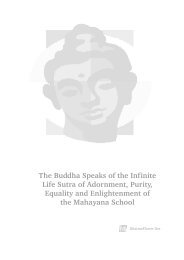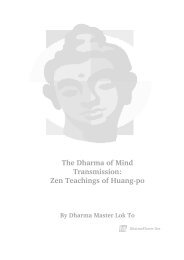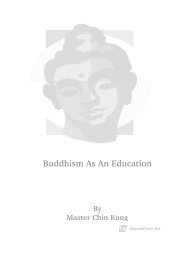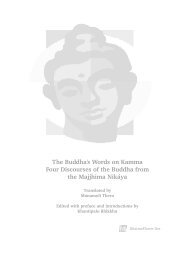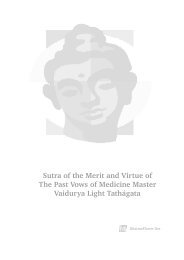Vipassana Meditation : Lectures On Insight Meditation by Venerable
Vipassana Meditation : Lectures On Insight Meditation by Venerable
Vipassana Meditation : Lectures On Insight Meditation by Venerable
Create successful ePaper yourself
Turn your PDF publications into a flip-book with our unique Google optimized e-Paper software.
Chapter FourThe Four Foundations Of MindfulnessWhen the Buddha had explained the seven benefits of mindfulness, hecontinued to explain the Four Foundations of Mindfulness:1. Kayanupassana Satipatthána2. Vedananupassana Satipatthána3. Cittanupassana Satipatthána4. Dhammanupassana SatipatthánaKayanupassana Satipatthána means contemplation of the body ormindfulness of any bodily process as it occurs. Vedananupassana Satipatthánameans contemplation of feeling or sensation. This feeling or sensation is ofthree types:(a) Pleasant feeling or sensation,(b) Unpleasant feeling or sensation,(c) Neutral feeling or sensation.Pleasant feeling or pleasant sensation is called sukha-vedana (sukha meanspleasant, vedana is feeling or sensation). Unpleasant sensation or unpleasantfeeling is called dukkha-vedana in Pali (dukkha here means unpleasant).Neutral feeling or neutral sensation is called upekkha-vedana (upekkha meansneutral - neither pleasant nor unpleasant). When pleasant feeling, unpleasantfeeling or neutral feeling arises, a meditator must be mindful of it as it is.Some meditators think that unpleasant feeling should not be observed becauseit is unpleasant. Actually, all kinds of feeling must be noted very attentively asthey really occur. If we do not observe or note the pleasant or unpleasantfeeling or sensation, we are sure to become attached to it or repulsed <strong>by</strong> it.When we like a particular feeling or sensation, we become attached to it. Thatattachment or tanha arises depending on the feeling or sensation. In this case,the pleasant feeling is the cause and attachment is the effect.If a meditator practices strenuously and perseveringly, his concentrationwill become deep and strong. When the meditator's concentration becomesdeep and strong, he feels happy and experiences rapture because his mind is,at that moment, quite free from all defilements such as greed, hatred,delusion, conceit and so on. The persevering meditator has attained a verygood stage of insight because his mind is now calm, tranquil and serene. If themeditator enjoys it and is satisfied with what he is experiencing, it means he isattached to it, and thus he cannot progress to the higher stages of insight. Such26



